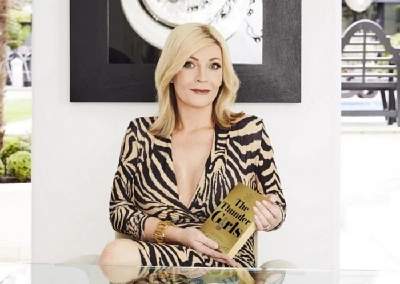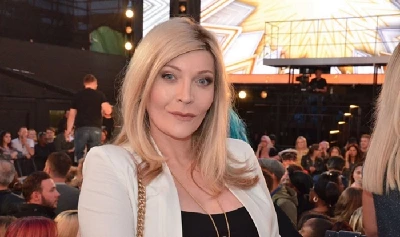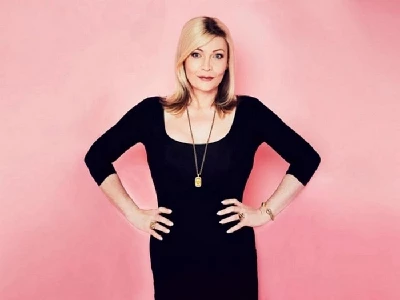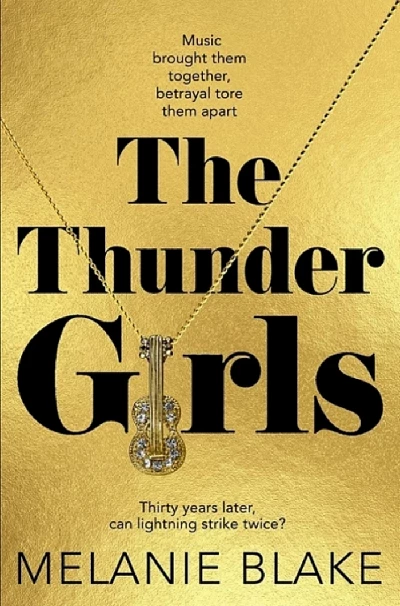published: 27 /
5 /
2020

Multi-millionaire music manager Melanie Blake talks to Nick Dent-Robinson about her working class Manchester upbringing, experiences of working on 'Top of the Pops' in the 1990s, bestselling debut novel, 'The Thunder Girls', and writing career.
Article
Melanie Blake is not a household name. Now 42, Melanie is a glamorous multi-millionaire music manager turned successful novelist who, during its 1990s heyday, worked behind the scenes on BBC TV's 'Top of the Pops' alongside the likes of Blur, Oasis, The Spice Girls, Take That and so many more famous names. Her experiences back then provided great material for her first top-selling novel, 'The Thunder Girls', which is published by Pan Macmillan and has been re-released as a special edition ebook for the Covid-19 'lockdown'.
Melanie began our discussion by talking a little about her background – from a solidly working class family in Stockport, Greater Manchester. Her mother was a cleaner and her dad a printer. But, when she was seven, her dad turned extremely religious overnight. “I'm not sure what sparked his conversion, but suddenly TV was banned and 'Top of the Pops' became the Devil's music,” Melanie recalls. “Even as a young child I resented that and would hide pop posters at the back of my wardrobe. Otherwise my dad would rip them up and call pop stars 'false idols'. It was depressing.”
At the local comprehensive school Melanie and her brother attended, the headmaster told her she'd never amount to anything. Her mother would take her to cleaning jobs to stop her upsetting her father by watching TV. Sometimes she'd send Melanie to the library for a book to keep the girl occupied while she cleaned. Melanie enjoyed reading. Then, when she was nine, Melanie borrowed the Jackie Collins book, 'Rock Star' - all about pop music and managers. “It changed my life,” Melanie says now.
“It was about women who didn't have lives like my mum, who didn't stand underneath Stockport Viaduct sheltering from the rain, eating Jaffa Cakes. At the age of nine I discovered that you could, if you really, really wanted it, have a very different life from my mum's.”
At around sixteen, Melanie ran away from home and lived in a squat in Oldham. She worked under-age in a scruffy bar to save the money to move to London. She did some work experience in a record shop to help her learn what music people buy and why.
Then, on her 17th birthday, she arrived in London. She knew nobody and had just enough money saved to last three months. She wrote to every TV company, music manager and agency she could find and eventually landed a temporary job handing out flyers. For the next two years she achieved nothing; no interviews, no returned phone calls, zero. Then, as she approached her 19th birthday after a dismal day handing out advertising literature and free drinks at Euston station, she decided she'd had enough. She would head back to Manchester, make the best of things and just accept her dream life in the music world was never to be. But that night, when she returned home, the phone was ringing.
“I couldn't believe it. An agency was asking me, 'Have you ever been a TV camera assistant?' I lied 'Yes' though I'd no clue what that was. And they said, 'Can you get to Elstree for 10.00am tomorrow?' - I'd no idea where Elstree was either but I said, 'Of course' and I was there at Elstree before 10 the next morning. As I arrived, I looked up at the studio and it said, 'Top of the Pops' - and I just gave huge thanks. I thought, 'Thank you God; it's not my dad you are looking after, it's me!' - and that was the start of an amazing new life!”
“What followed was a true eye-opener,” Melanie continues. “Whilst what 'Top of the Pops' viewers saw was like a PG rating, what went on behind the scenes was definitely an 18 rating...a riot of debauchery, bitching, sex, rampant insecurity with A list stars and D list divas."
“Pop can be an evil, twisted, mad place at times. But, when you think about it, who could ever expect pop stars to be normal. If someone knows they're so juicy they can go out and entertain 100,000 people, why would they expect to make their own cup of tea? These people are show ponies, preened, pushed around and then, quite often, quickly dumped.2
“There are exceptions – and often the longer experienced stars, the really mega names, have learned to be okay. I was very fond of Michael Hutchence who would talk to me for hours about life, loves, dreams, ambitions – though sadly he did drink a lot and was addicted to drugs. Pink Floyd were fine as was Bowie and many from that earlier generation. In fact they were surprisingly nice. But often the people around them weren't - the managers and agents and publicists and hangers-on. We were all told by one of Jennifer Lopez's crew that we must never dare to look her in the eye. Yet when she heard this she was furious...she wasn't that way at all."
“Beyonce, then still with Destiny's Child, is also lovely, not at all grand, and Kylie Minogue is a really nice, decent person too. Britney Spears was sweet but very lonely and poor Whitney Houston was surrounded by a toxic bubble of clingers-on. Mariah Carey was okay but would bore easily and threaten to just leave; once I had to go out and borrow some kittens for her to play with in her dressing room. Robbie Williams, then still in Take That, thought he could do whatever he wanted – like kicking footballs against the studio doors during recording. When I told him to stop he went ballistic and said he'd have me fired. He was such a dick back then. But he was at the height of his fame and arrogance and he's not remotely like that nowadays. The boy bands were just big kids really – setting off fire alarms, fighting each other with fire extinguishers. Whenever Oasis and Blur were on the show together, the BBC would have to double security because they'd actually tear each other apart. Pathetic really. Many of the people within the bands hated each other. They'd achieved rapid success but then felt lost, like they were trapped in a bad marriage."
“The Spice Girls were interesting. The two Mels were strong performers and pretty professional. However I always felt Geri Halliwell was a bit of a joke. People loved her as she had little obvious talent but huge charisma and massive determination. But gradually delusions of grandeur set in. Posh boys, posh clothes, the boobs go and she's suddenly stick-thin with a fake posh accent and she's doing stuff for the UN. But what people had loved about her was that she was just a girl from Watford with big tits and a can-do attitude. Once she lost all that, the appeal waned. Her last record, released in Australia, sold just 400 copies...very sad! I always liked Victoria Beckham - though she seemed insecure in the early days. She wanted David Beckham to be in her sight whenever she performed and I was asked to ensure he was always within her view. Once we hid him in a huge speaker in the centre of a dance floor with screaming girls all around. As a top soccer star, he had legions of female fans back then and the girls had no clue he was there and would have wet themselves if they'd known.” Melanie pauses to laugh out loud at this prospect. “But Posh was a real grafter like Halliwell,” she continues. “She deserved her success. By contrast, Sophie Ellis-Bextor was so talented that success just came to her. Though deservedly so; she is fabulous."
“The sad thing is that pop stars are often driven by insecurity and frequently find fame and fortune are not all they are cracked up to be. f you get all you thought you wanted and it doesn't make you happy, then what will? When you've had worldwide adulation, more money than you could ever spend, anyone you choose sleeping with you, everyone constantly saying you're wonderful - and none of it fulfills you, then a huge void follows. And that's when drink and drugs come in. Dave Stewart, who was in Eurythmics and is a brilliant record producer, calls it 'paradise syndrome' where you have all you ever thought you needed to be happy, but you're not happy."
“Often those who do better, just step away from it all. Maybe they focus on family or diversify or just learn how to take charge and manage their lives better. Good examples are Lionel Richie or Alice Cooper or Beyonce - or Robbie Williams nowadays. On 'Top of the Pops' I always found the bigger stars and the most accomplished musicians were much easier to work with and generally nicer people. The worst ones were the cocky young kids with their first hit single who could be a nightmare. Or the soap stars turned pop stars who were absolute monsters...the very worst of all! If they were in a soap and landed a record deal they'd have ginormous entourages, be rude and insulting to everyone and demand a degree of pandering that had to be seen to be believed. Just awful!"
“There were amazing parties after 'Top of the Pops' too. I'd often be at the Primrose Hill home of Noel Gallagher and Meg Mathews, then a couple. I never did drugs but of course it was a big drugsfest with so many different couples at it constantly on assorted beds and sofas in a huge room. I used to phone my brother from the bathroom and say, 'You'll never guess what I've just seen...multiple coupling plus lesbian threesomes all over the place...' and he'd roar laughing at it all. There would be other parties in big rooms at Claridges Hotel and everyone would be at it on the bed...just crazy. I was always glad to have been well grounded with my Manchester down-to-earth background which could never have let me stray too far into participating in so much debauched behaviour.”
Melanie enjoyed four years on 'Top of the Pops' not doing too much but having a great time – until a change of producer saw her move on, reinventing herself as a music manager. By now she had huge numbers of contacts across the whole field of rock and pop. Her clients soon included Claire Richards from Steps, Bros, several of Spandau Ballet, Mis-Teeq and many others. She specialised in what she calls the 'after the screaming stops' rock stars, getting them into other fields like TV deals, writing, clothes and cosmetics endorsements and brand-building. This is how she earned the fortune she now enjoys spending on fashion, handbags, shoes plus friends and family. “My expertise was trading talent for as long as it was viable – and my speciality was trading post-pop stardom.”
Having made enough money for a comfortable long-term life, Melanie turned her hand to writing. She'd loved reading from an early age and had always yearned to be a writer. Her first novel, 'The Thunder Girls', was an immediate success. It's about a girl band who reunite thirty years after they split. And most of the more outrageous scenes in it are absolutely true, Melanie asserts. She has never married and is happily single, saying dating distracts her from working. She has never forgotten the inspiration Jackie Collins gave her. After theauthor's death, some of her jewellery was auctioned and Melanie bought five pieces, including a 50-carat morganite and diamond necklace. “I have never forgotten the impact Jackie Collins made on me,” Melanie says. “She changed my life. Who could have imagined that the little Stockport girl who read Jackie's book could have had the life I've enjoyed? I am still incredulous about it...just can't believe it all happened. And becoming a successful writer has really been the icing on the cake for me...Jackie Collins would have understood that!”
Band Links:-
https://www.melanieblakeonline.com/
https://www.facebook.com/melanie.blake
https://twitter.com/MelanieBlakeUK
Picture Gallery:-


